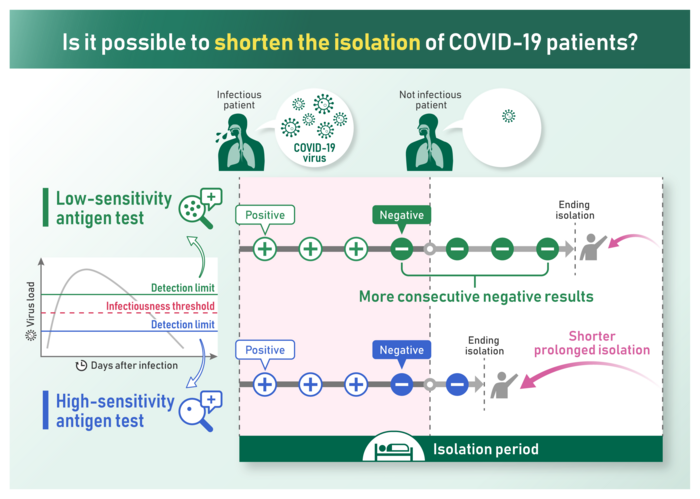Kyoto–Across the world, many people infected with Covid-19 have been made to completely isolate from others in order to avoid passing on the infection. Some countries still recommend minimum isolation periods for as long as 10 days from when patients start to develop Covid-19 symptoms.

Credit: LAIMAN
Kyoto–Across the world, many people infected with Covid-19 have been made to completely isolate from others in order to avoid passing on the infection. Some countries still recommend minimum isolation periods for as long as 10 days from when patients start to develop Covid-19 symptoms.
Professor Shingo Iwami, affiliated with Kyoto University’s Mathematical Biology Laboratory at the Institute Advanced Study of Human Biology (WPI-ASHBi) says, “Although a long time for isolation reduces the overall risk of patients passing on the infection, there will always be patients who recover early and have to accept several days of redundant isolation while no longer posing an infection risk. We would like to calculate a way to reduce this unnecessary disruption in people’s lives as well as the broader losses for the economy.”
Writing in the journal Nature Communications, an international team of scientists, led by Iwami, has reported a simulation of the potential risks and benefits of ending an individual’s isolation early using antigen tests instead of isolating patients for a fixed time. They call for more sensitive and regular antigen testing to help reduce isolation periods for patients recovering from Covid-19.
The team decided to base their model on antigen rather than PCR testing, trading sensitivity for short turn-around time, low cost, and practicality. Iwami explains that although antigen tests do have a risk of generating “false-negatives” and fail to detect individuals who could still be infectious, there are clear benefits to getting results within an hour rather than waiting a day.
Their model accounts for the sensitivity of antigen tests as well as factors like the amount of virus in a patient that makes them infectious. These are then balanced against the acceptable risk of missing unrecovered and potentially infectious patients, by letting them out of isolation early.
Using their model, the team compared different scenarios to identify the best strategy. For example, the model projects that letting a recovering patient leave isolation after 2 consecutive negative results on 2 days in a row would spend 3.9 days of redundant isolation after their recovery. But under these conditions 1 in 40 patients would continue to pose an infection risk.
More conservative approaches might increase the burden on patients by requiring more than 2 consecutive negative test results of antigen tests.
Iwami says, “The epidemic has still not completely subsided, and we are living with a lot of uncertainty with regard to new variants of the virus. Antigen tests could help, but there is also a real need for worldwide systematic guidelines that simultaneously reduce risks and burdens. We hope this simulator will help doctors and policy makers meet those demands.”
******************
About WPI-ASHBi https://ashbi.kyoto-u.ac.jp/
Institute for the Advanced Study of Human Biology (ASHBi) was launched in October 2018 with funding from the World Premier International Research Center Initiative (WPI) Program of the Ministry of Education, Culture, Sports, Science and Technology (MEXT). The Institute inaugurated with 18 principal investigators (PIs) to create and promote human biology to elucidate key principles of human traits, including disease states. The Institute will perform interdisciplinary research between biology and mathematics (machine learning and topological data analysis) and between biology and humanities/social sciences (bioethics and philosophy on life), respectively. The Institute implements three research development cores for cutting-edge single-cell genome information analysis, primate genome editing, and non-human primate phenotype analysis, respectively. The Institute establishes a link with international institutions such as the EMBL, University of Cambridge, and Karolinska Institutet, creating a stratified organization for research promotion and strengthening its international profile.
Journal
Nature Communications
DOI
10.1038/s41467-022-32663-9
Method of Research
Data/statistical analysis
Subject of Research
People
Article Title
Designing isolation guidelines for COVID-19 patients with rapid antigen tests
Article Publication Date
20-Aug-2022




